Seven (7) Questions: There to Here – Jennifer L. Ernst
Gallery

Have you ever met a person who just make you feel you have always known them? Newly appointed Associate Dean Jennifer Ernst of the School of Communications is such a person. Jennifer is an extremely intelligent and competent person. Jennifer, like so many other Henry Ford College’s staff is dedicated to the success of Henry Ford College students. Mrs. Ernst openly shares her challenges in pursuing her education.
The reason why I developed this column is to enlighten students that their professors faced the same challenges that they may be experiencing pursuing their degree. When I am working with a student and they generously share their challenges, I share a saying I learned that “you go to school and sometimes life gets in the way”. It is important to understand that life goes on, problems are going to occur while you are pursuing your education. College experience can provide you with the skills of managing obstacles.
I think as you read her responses, you will realize Jennifer is a person who is a perfect example of what students experience as they pursue their educational goals. Jennifer shares how she went to several colleges in different states and earning 211 credits before she obtained her undergraduate degree. Hopefully Mrs. Ernst story will be inspirational and demonstrate with persistence you can achieve almost anything. Enjoy!
- What degrees have you earned to date?
- As an Associate Dean_______________ of the college what are your responsibilities?
- As an undergraduate student, what was you experience like?
- What was the most difficult challenge you faced while in college and how did you manage it?
- What do you believe are the rewards of your education?
- Did and do you have mentors in your life?
- In giving advice to students regarding pursuing their dreams, what role do you believe charity, gratefulness, self-determination and forgiveness play in the success of a person’s educational pursuits and a productive life?
A BA in English Literature at the University of Pittsburgh and an MA in English Language and Literature at Duquesne University.
My job is to make sure that the Communications Division runs smoothly so that instructors can do what they do best – teach! In that capacity, I am responsible for budgeting, scheduling, strategic planning, ensuring that the curriculum is approved by College Council, handling student complaints, and solving whatever problems may arise.
My undergraduate career spanned 8 and a half years, 5 schools and 4 states. I transferred so many times that I ended up earning 211 undergraduate credits! I put myself through school, and I was determined to do it without taking out loans, so I had to stop and start a lot.
Probably the most difficult challenge was getting started. No one in my family had ever been to college so I didn’t understand anything about SATs, placement exams, financial aid, applications, how to choose classes, what to major in, etc. I did fairly well in high school, and I lucked into a scholarship at the local community college. I owe every other good thing in my life to that opportunity. It is the primary reason I have chosen a career in community college education; I want to make sure that opportunity is available to everyone.
The primary reward of my education is the chance to do something really meaningful with my life. There are a lot of jobs I could do, but my education has allowed me to do one that fundamentally changes other people’s lives. That’s pretty powerful stuff.
I most certainly have had several mentors. I would not be where I am without them! When I was an undergraduate, two of my professors, Alice Matthews and Stephen Carr, told me that I could go to graduate school. In all honesty, I never would have even considered applying without their influence. More recently, I have been especially grateful to the former Associate Dean of my division, Katherine Grahl, for all of her incredible support and smart advice. She is one of the most generous people I know.
I have always followed two philosophies in my life. The first is from the Roman Stoic Philosopher Epictetus who contends essentially that you cannot control the actions of others; you can only control your own actions and reactions. I think that adopting this perspective is incredibly freeing. It takes away the power that negative people have over my life and allows me to forgive a lot more easily.
The second philosophy was something my mother used to say: “You never regret choosing to be kind.” She is right. I have chosen other paths and wished I hadn’t later. I never regret choosing to treat other people with kindness even if they aren’t treating me that way. I think the world would be a better place if people just chose to be kinder to one another
